by Frank | Sep 21, 2017 | housing co-op life
Musings on living in a housing co-operative
After writing this yesterday about helpful mindsets when applying to live in a housing co-op I thought I’d update it with a few quick thoughts about helpful mindsets when actually living in one. This’ll be a quickie – I need to go and chair our weekly co-op meeting very shortly!
Patience
It can take a while for decisions to be made; it can take a while for fellow communards to come around to your point of view. It can take a while for things to get done. This is good: you learn negotiating skills, you learn non-attachment.
Adaptability
You might have an idea about how something should be done. But someone might have a better idea. It isn’t about winning in a co-operative – it’s about getting the best result for everyone. Don’t lose sight of the goal because you have too much attachment to your particular means of getting there.
Also, sometimes you might have yourself set on doing a particular task and suddenly you get overtaken by another one – a community member might ask you to move some furniture, help them unblock a sewage pump or (heaven forbid) plan a wedding. You can always say no – but it really does help if a lot of the time you can say yes.
Willingness to learn
I am one of those people who, when they are nervous or unsure, try to show that they are capable by communicating how much they know about a situation. Sometimes this unwittingly comes across a bit know-all-y or splain-y (I’m using this as a cut-off of mansplainy but obviously I am not a man, so…). But this doesn’t mean that I actually do think I know more than someone else or that I am not really bothered about learning new things – in fact, I am happiest when I am devouring new information or skills. It’s more that I’m trying to show that I’m interested in the subject. It’s good to approach living in a co-op with a kind of humility – even if you’ve lived in community before each one will be different, and you will learn new things, not least about human nature and especially about yourself. There’ll be people at the co-op who have been doing this a lot longer than you – it’s a good idea to show them some respect! And often, there are several ways to skin a cat, so be open to others’ views.
Willingness to listen
And this doesn’t just mean hearing. Sometimes someone will react badly to a suggestion. You might get angry at their reaction but it helps to have a kind of attitude of sitting back and watching and listening – we all have our little weird psychological triggers and if you can get into the habit of instead of thinking “so-and-so is being a dick right now” deciding to think “so-and-so seems weirdly angry about this – I wonder what’s up with them and how I can find that out without upsetting them even more” your people skills will power up close to final boss level*.
Awareness of others’ boundaries
When I moved in I checked really carefully with the people in the rooms next to mine – whether they could hear my music, hear me watching a film. I checked if it was okay to use this room at this time, eat this food, weed this bed, light this fire. It’s better to ask than assume – feel out those delicate invisible boundaries, don’t stomp all over people’s heads, and try and make sure that most of the ripples you cause by moving in are positive ones. It’s basic respect, isn’t it?
That’s pretty much it for now. Will add to this if I think of anything else.
*I am not a gamer and haven’t played anything since Super Mario Bros on the original gameboy. I am just trying to be down with the kids here. It’s pathetic isn’t it.
by Frank | Sep 20, 2017 | housing co-op life
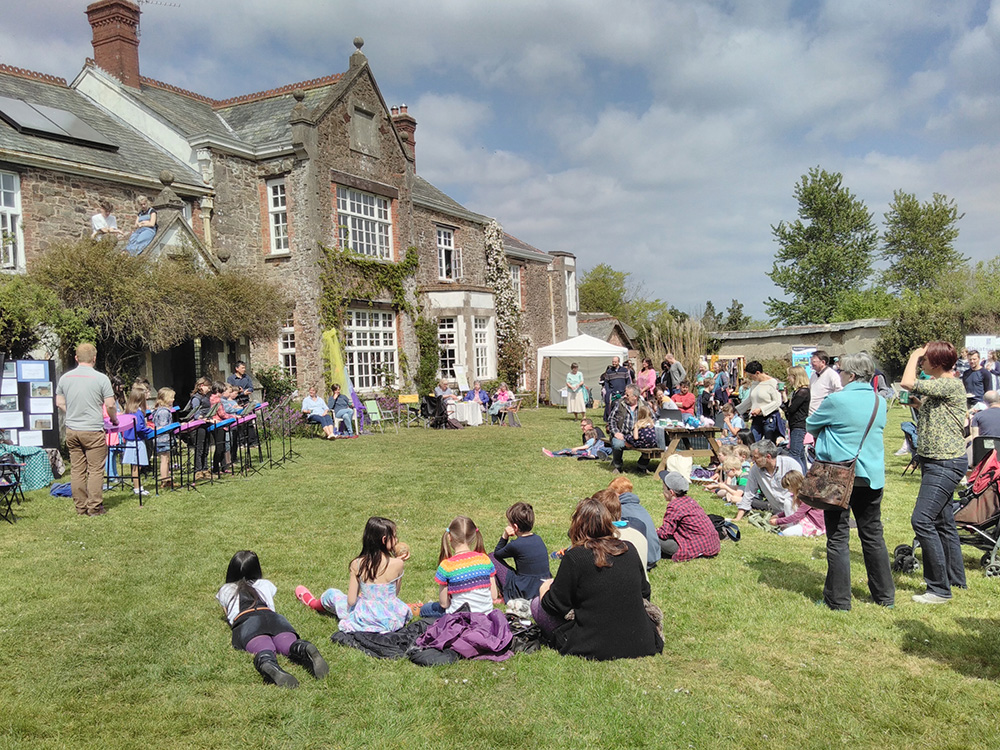
IDK why I’m using this pic of an open day we hosted here. It’s nice & there’s a school steel band – what more do you want?
Further musings on living in a housing co-op
I’ve written a series of blog posts about living in Beech Hill Community Co-operative & you can find the other ones here. Today I’m thinking about the kind of outlook I think it helps to have when applying to join, and living in, a co-op.
“What’s in it for me” doesn’t get you in it
Well, it is important that you benefit from living in a co-op. You shouldn’t need to make profound personal sacrifices to join. But once you’ve decided that you’re interested in living in a community, I’d suggest thinking along the lines of what you have to offer them, rather than the other way around. You can find out the cost of the rent, the kind of work expected of you and the facilities that exist onsite with an attitude of seeing whether a place is a good fit for you and your needs. It’s probably a bad idea to rock up to a co-op and say, “I’m just looking to see what you have to offer.” (it has happened).
For example, when I was looking at co-ops I visited a place where they didn’t have much land to grow veg, and seemed to have a lot of conflict, and I figured that both of these factors didn’t fit with me. When I visited Beech Hill they had a lot of space for growing and also they all seemed to get on really well, and so once I’d decided that we were a pretty good match I wrote them an email listing what I could do and also what I wasn’t so good at.
A lot of what you get from living in community is what you bring to it. Bear in mind that there is always a lot of work to be done, so list any practical skills you have, talk honestly about how much time you’d be able to commit to working, and how you’d make your money in the outside world. Rent is often cheap in co-ops, allowing members to work part-time and also meet the co-op’s work commitments. Here’s a post listing some of the work I’ve done here.
It’s a family affair
It’s worth realising very early on that what you are doing is moving into what is in essence a large family home. Make an effort to get to know the members, be honest about yourself, and realise that you and them both have to get something out of your moving in. In a small community often there is an issue with the balance of members being older, so younger members are always welcomed. A small community will need energy and skills and enthusiasm.
Ask ask ask ask
A lot of fuss and bother can be saved by asking questions about anything you feel you couldn’t live with. We recently had one person who was interested in joining coming to stay from overseas, and they asked about the meals. “They are all vegetarian, mostly vegan or with a vegan option as there are 6 vegans living here now, and often gluten-free too. You are welcome to cook meat in the other kitchen or in your own space. You sign up to cook once a week or fortnight,” I replied. This person looked horrified at the thought of having to cook vegan food and I think it put them off. If they had asked in an email about this they could have saved themself an airfare.
If you’re thinking of moving from outside the UK, bear in mind that most communities will want to meet and spend quite a lot of time with you before agreeing that you can move in – and all community members will likely want a say in this decision. As I said, you’re likely moving into a family space. If you’re coming from abroad this could get very expensive. It’s worth asking about the joining process before you consider a place. It is probably wise to check out whether you are able to move to the UK right at the start – our immigration policy is becoming tighter and tighter and the horror that is Brexit is looming. It would be terrible to spend time and money visiting and moving to a place only to be chucked out again by the Home Office.
Honesty is always the best policy
If you’re a bit of a loner who needs a lot of peace and quiet, mention it. If you have seventeen cats, mention it. If you’re planning to be away for three months a year, mention it. Be honest about what you think you’ll cope well with and what you think you’ll struggle with.
“Have you thought of…”
Communities always get people turning up who have a really good idea about how they think a community should be run. Sometimes there are wondrous ideas but mostly it’s pretty tiresome. If you go in with the attitude of learning why things are done a certain way in your particular community before suggesting fabulous adjustments your ideas are more likely to be heard. Go in with the desire to learn. Yes, I still think Beech Hill’s accounting system needs to be completely overhauled and started again from scratch. But we work by consensus here, and I’d need to find a way to convince the other members of the accounting team that it would be of material benefit. And to be honest, I’m generally too busy cleaning out jammed sewage pumps.
In it for the money
Some people want to move to a co-op because they are skint and it’s cheaper to live here, or they are having a difficult time and need some respite, or they’d like a nice relaxing place to live out their retirement and be looked after in their old age. None of these is a reason to join a co-op without a profound desire to live communally and do the work needed. Community living can be frustrating and it can be hard physical and emotional labour. (It can be bloody wonderful too though). I’ll admit that I had had a difficult time of it in the few years before I moved – a few deaths in the family and related upheavals meant I was exhausted and did need somewhere to regroup. But I had always been interested in co-op living, had a desire to set one up for myself and was really looking forward to throwing myself into the work here. Community members can smell when someone really isn’t after co-operative living and there’s just no point trying to fake it.
This isn’t to say that I believe housing situation in this country is acceptable. It isn’t to say that I think the options for older people’s accommodation are perfect. It’s possible to acknowledge this situation and also be very aware that we are one little community of (currently) eight members working very hard to keep a rambling old 16th Century manor house upright and six acres reasonably productive of veg, and we physically aren’t able to cope if more than a few of us aren’t able to work. This is sad and it pains me but there it is.
by Frank | May 9, 2017 | housing co-op life
 The latest in a series of posts about living in a housing co-op
The latest in a series of posts about living in a housing co-op
Here’s a quick post which should present a snapshot of what it is to live here.
Yesterday afternoon I was working in the paddock drawing a beech tree for an illustration. I heard the chickens making a lot of noise and so I leapt up and sprinted to their large pen to check for a fox. Our most elderly chicken was in the hen house, having just laid a rare egg, and was clucking loudly and indignantly at a rat she’d seen. I chased off the rat, let myself out of the pen and ambled slowly back to where I’d been sketching.
I wasn’t paying attention, I hit some uneven ground, my foot went over and there was a shock of pain and a crunching sound, a bit like the sound you make when you step into fresh snow. I did some loud and varied swearing. I could still walk on it – just – but I could tell it was going to get a lot worse really quickly,
I hobbled back to the house and immediately found some ice, some ruta ointment and a bandage. I sat on the bed and propped my foot up high.
My partner was staying at the time and brought me my share of the amazing communal dinner. He needed to get back to Bristol today and while he was loading our plates last night was offered a lift to the station by two different people (me not being able to drive him now).
This morning I had three people knock my door, one bringing more ruta ointment, another asking if I needed any shopping (why on earth I didn’t ask for a big bag of vegetable crisps and a pot of humous is beyond my ken), offering to water my plants in the greenhouse and polytunnels and another just now offering to make me tea and lunch.
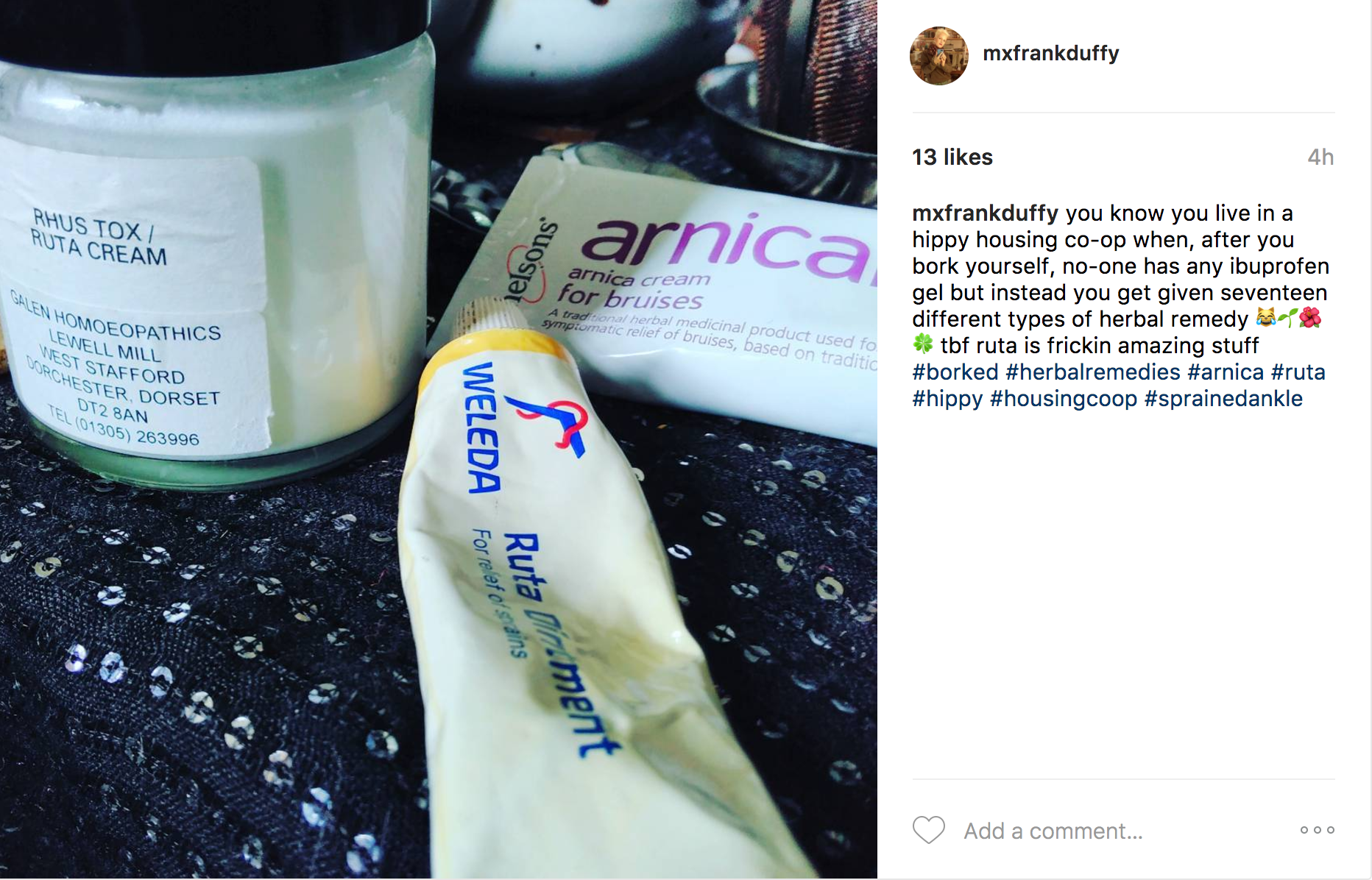 This evening someone will bring me my dinner and I’m sure there’ll be other people just checking to make sure I don’t need anything.
This evening someone will bring me my dinner and I’m sure there’ll be other people just checking to make sure I don’t need anything.
When I first moved in I got a very painful thing called trigger thumb & could hardly do anything at all. I felt awful – I’d just joined and I wasn’t able to contribute & everyone was looking after me. I got told I was being ridiculous (such is my wont) in a very loving way and was made to rest, and indeed was told off for trying to do stuff.
When another co-op member was ill with flu I was driving to the nearest town and asked her if she needed anything. She gave me £10 and told me to spend it on fruit in the green grocer and I took great delight in selecting pineapples and mangoes and lychees and all other of exotic loveliness for her. It felt really good.
So yep, that’s living in community.
by Frank | Feb 6, 2017 | housing co-op life
Consensus, or, how we get things done
Another of my posts about living in Beech Hill Community Co-operative
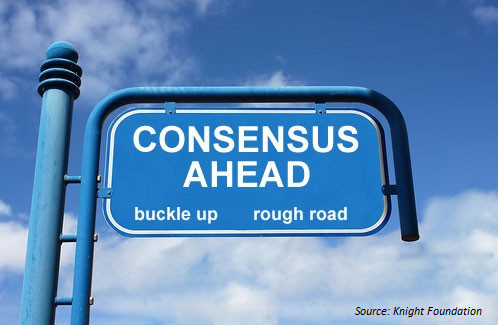
No-one knows how many badly-photoshopped roadsigns there are on the internet
Consensus means that we all agree on what we do. There are many different ways of achieving it, and the way at Beech Hill is this:
- there is a weekly meeting on Thursday nights
- you write the thing you want to do on the agenda for the meeting. If it is a quick subject – likely not to take up too much time to talk about, or it is urgent, you write the letters Q and/or U next to the subject. You don’t need to write an explanation. Agenda items have been one word: “Rats!” and sarcastic “Let’s set all of our chopping boards on fire!” (yes that was an actual agenda item)
- You talk about your thing at the meeting. If what you want to do is Big or Different or Possibly Controversial, it’s a good idea to run it past a few people a few days before the meeting to give them time to think about it.
- People discuss your thing. Ask questions. Put forward alternative proposals. It might be carried forward to the next meeting if members need time to digest it.
- People will agree to your thing or not agree. Everyone has to agree (that is consensus) or at least, not disagree. Once or twice I have noticed that a member has said, “go ahead with x, but I don’t agree with it and I want that noted in the minutes of the meeting.” Even though they are not agreeing they are consenting to it happening anyway.
Why consensus?
Why not voting? Well, I think we can look at exhibit A, labelled “Brexit”, and exhibit B, labelled “Trump”. What consensus does, or should do, is get past binaries of yes or no, with us or against us. We are open and honest about any given subject and listen to all sides of an argument carefully (cf: Brexit; Trump) and try to work together to find a solution that works for everyone. It’s not about what – or whose – side you’re on, but how we can find a way forward together.
 I decided to write this post, partly because when I asked people what they wanted to hear about on my facebook page that was one of the requests, and partly because I was thinking about something that came to the meeting recently. One of our members had suggested a change which she was really excited about but which, if left unchecked, could seriously affect the quality of my life at Beech Hill. Here was the difficulty: I totally understood her position and what she was excited about and I felt that I would be a miserable nazgûl bastard telling her DO NOT WANT.
I decided to write this post, partly because when I asked people what they wanted to hear about on my facebook page that was one of the requests, and partly because I was thinking about something that came to the meeting recently. One of our members had suggested a change which she was really excited about but which, if left unchecked, could seriously affect the quality of my life at Beech Hill. Here was the difficulty: I totally understood her position and what she was excited about and I felt that I would be a miserable nazgûl bastard telling her DO NOT WANT.

A miserable nazgûl bastard
She had done the thing of telling me in advance of the meeting so I could think about it, and thus, having lain awake thinking about it, I tentatively approached one of the longest-serving co-op members and asked her opinion on the matter. She showed me hers and I showed her mine and we talked about it. She thanked me for my honesty and I thanked her for her advice and she then told me I should share my feelings about the plan in the meeting. Before the meeting I talked to two more community members about the plan – one had come up with a “solution” that would have been even worse for me (argh) and the other shared my concerns and had more of her own.
At the meeting we were all open and honest about how we felt about the proposition and we agreed that it could go ahead but with certain caveats – that my concerns and the concerns of others were prioritised.
Numbers
What is important about this system is the numbers required to make it work. In my tenancy we’ve had between 9 and 13 members (I think) and 13 is about capacity given our current accommodation. If we had 20 members the current system might become unwieldy, and we might look at other ways of achieving consensus.
Who’s in charge?
People always ask this and come closer, dear reader, and I will speak truth to thee: the One In Charge is… everyone. Really. There’s no boss, no leader, no one person (or group or clique) that Decides. I was actually astounded by this when I joined. My ideas, even before I became a co-op member (there is a trial six months of living and working with Beech Hill full time before you can join) were taken as seriously as anyone else’s, as were my opinions and objections. Everyone’s thoughts are valued. If there is someone who has some expertise in a subject then their opinion is given a bit more weight on that particular subject – if we need to fix the roof we pay attention to what the co-op member who is a builder says. That’s just common sense.
No decrees are issued – everything is debated. It takes more time and can be frustrating but it means that everyone knows the reasons for any particular decision and everyone consents to it.
It doesn’t always work
Probably the thing that goes wrong the most is when we all come to a decision about something and then a few months down the line the decision is forgotten and needs to be remade. And that’s a waste of time. You might get bored with emptying mouldy half-cans of baked beans from the fridge and get agreement from everyone that things in the fridge are put in tupperwares and labeled with the date, because, you know, food hygiene is a lovely thing. And yet, six months down the line, what is this festering at the back of the fridge? Why! It is half a can of baked beans.
The other thing that goes wrong is that sometimes people take it upon themselves to do something that they really should ask the meeting about, and they don’t. You don’t have to achieve consensus for every little thing – I got given a bird box and put it up on the grounds without asking a single other soul. But that’s a little thing. After living here for nearly a year and a half I have a good idea of what requires agreement and what doesn’t…

Chairman Meow (courtesy of Newtown Graffiti on Flickr)
Benevolent dictatorship,
or, how not to do it
This is how I will run the world once I am swept to power but it is not appreciated at a community co-operative.
One time I made the mistake of accidentally redecorating a corridor without running the colours etc past the main meeting. Oops!
What had happened was that I had booked some time off paid work before Christmas, months in advance, to do this work. And then one of our co-op members suddenly died at the end of October so we spent the time after that organising the funeral, grieving, working out who was going to take over the really important jobs he did, and generally only dealing with the really urgent important stuff. And so the week of decoration loomed up on me and, though I’d shown the colour palette past a few people, and was naturally confident that it would look amazing because colour is my hecking job, I didn’t actually announce to everyone when & how I was going to do it. So I’m there, up a step ladder, brush in hand, cutting in a lovely dusky pink over the old acid green, and other co-op members are, oh, you’re painting the corridor? I didn’t know that was happening!
I was clearly headed for trouble. At the next co-op meeting my guerrilla decorating was raised and I threw my hands up in surrender and admitted I was in the wrong and pleaded extenuating circumstances and promised never to do it again.
It’s all okay, though – everyone agrees that the corridor looks lush.
by Frank | Jan 16, 2017 | housing co-op life
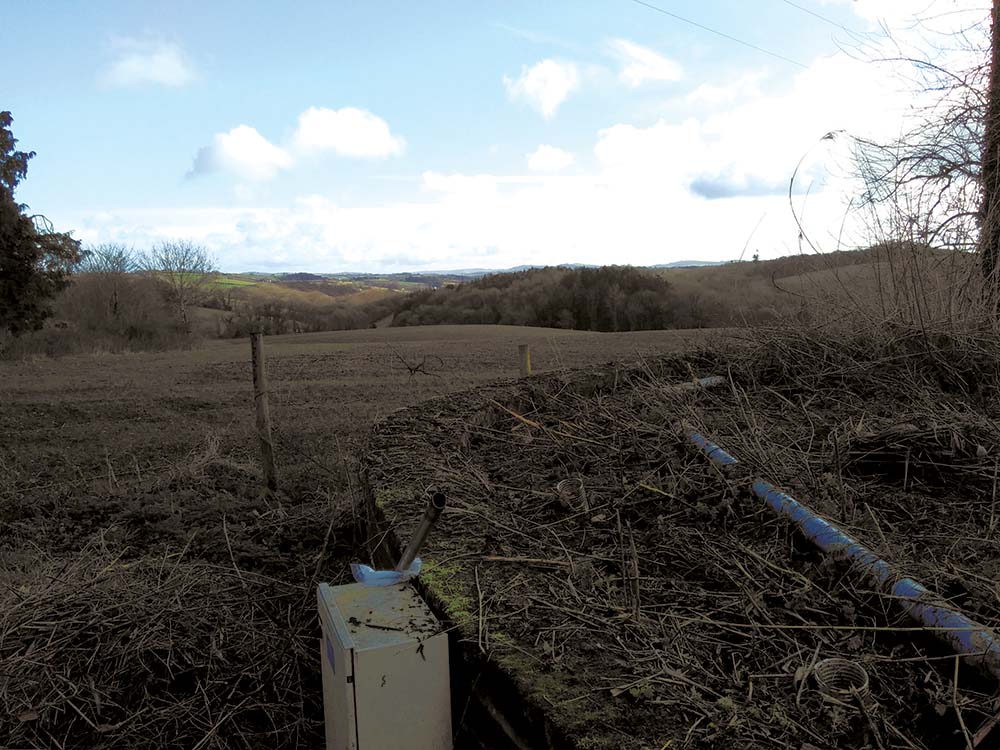
The reed beds in winter – the reeds have died down and will regrow in spring. The view is rather nice.
Housing co-op life: work
Another blog post about living in a community co-operative
I’ve started writing blog posts about living at Beech Hill Community Co-operative in Mid Devon, where I’ve been living since September 2016. People seem to like them so, well, I’ll keep going for now…
This one’s about work – specifically, the responsibilities entailed with living here.
It’s cheaper to live here than in the Real World and part of the reason for that is that a proportion of our rent is paid in labour. We’re supposed to contribute two days or 16 hours a week to the co-op, and it doesn’t really matter if that’s two and a bit hours a day, two full days in the week or a seven day week a month, as long as it gets done. No-one is counting your hours and it’s up to you to make sure you do them. There is always plenty to do here.
The Protestant Work Ethic vs Catholic Guilt (there are none practising here of either flavour to my knowledge but indoctrination sticks pretty hard)
People are very good at doing their allotted amount to the point of feeling guilty about taking time out and sitting in the sun reading a book while someone else walks past with a wheel barrow. I think that is probably the biggest problem here. People were feeling that they had to leave the site to have a break and damnit, we live in a picture-postcard manor house with glorious grounds and a camping paddock and a swimming pool and I want to enjoy it.
So at a co-op meeting I suggested – and got agreement for – the concept of a Beech Hill Holiday, which is when you take a week off from doing anything at all for Beech Hill and you announce this at the weekly meeting and so everyone knows you are on holiday and they don’t ask you to do things and you can lie around talking to the chickens and admiring the rooks and being grateful for living somewhere so glorious.
What work?
Much work, but very little of it *feels* like work.
Regular jobs for me include:
- Cleaning one of the bathrooms (we all sign up for various jobs & this is one of mine)
- Feeding the chickens at dawn (there are 3 people who do this, a week at a time)
- Moving wood from the outdoor storage bays into the boiler room (everyone does this in winter)
- Feeding the wood-fired boiler (everyone signs up for this & it needs doing twice a day in winter)
- Cleaning the boiler (me & one other person – once a month)
- Updating the website & facebook page (me)
- Watering the indoor plants (me)
- Cooking an evening meal (everyone – you cook once or twice a fortnight)
- Washing up (everyone – maybe once a week each)
- Weeding the reed beds (everyone)
- Checking the reed-bed sewage system is functioning (me & someone else)
- Putting the recycling out (me & someone else)
- Doing the accounts (me & two other people)
- Gardening (everyone)
- Painting & decorating (everyone – an occasional job)
- Maintenance (everyone – from painting a window frame to repairing a roof)
- Liaising with contractors – chimney sweep, electricians, plumbers etc (everyone)
- Releasing caught rats (me)
- Cleaning the main kitchen (two people every week)
- Buying food, tools or other things we need
- Attending meetings
There are loads of things other people do that I don’t – I’ve never mowed the lawns, for example. But these are things I have done. There’s probably more.
Work/life balance
It takes a good while to work out how you’re going to divide up your time. And you might want to divide up your time in different ways at different parts of the year. In May and June, when everything is growing, you might want to spend at least an hour every day in the polytunnels and veg patches. Owing to paid work and master’s commitments I did very little at the end of November and the first half of December, and then just before Yule I spent over a week wallpapering and painting a corridor.
And there are meetings, where Things are Decided. And you volunteer to do jobs at the meetings, and put your name down to do a certain thing at a certain time. You get very good at keeping a diary here. It can be hard work, and I wouldn’t like to be working full time and living here. Most people here work part-time, or are retired. Which is why it has to be cheaper to live here.

Our assertive signs. Designed and illustrated by you-know-who, with a nod to Saul Bass
The Shittiest Job
The worst thing I’ve done here was fixing the reed bed sewage pumps. Our reed beds, because they are not on enough of a slope, require pumps to get the liquid into the beds for filtering. If some utter, utter bastard ignores all the large assertive signs in the loos and flushes a condom, a tampon, a wet-wipe or basically anything other than what came out of their body and/or toilet roll, the filters for these two pumps gets blocked, seize up and trip a circuit board. The circuit board needs checking once a week and sorting if blocked or the sewage chambers fill up and can back up the system. Use your full and vivid imagination to work out what happens when our sewage system gets blocked and decides to back up.
The person who used to keep an eye on the reed bed circuit boards & pumps died at the end of October, so I volunteered to try it, on the condition that if it was like something out of a Korean horror film I could absolutely say fuck off I am not doing that again.
I bought some really long super-strength gloves and some masks that say they keep out bad smells, but this turned out to be a marketing lie. I pulled on overalls and another community member volunteered to help me, which was brilliant as I don’t think I’d have been strong enough to hover over the manhole to the sewage chamber and pull up the pumps, which hang from ropes inside the chambers. I probably could have done it but it might well have broken me, and nobody wants to be broken while lying next to a feculent void wearing an odour-preventing mask that tells basic marketing lies. He pulled up the pumps, we hosed them off and I unscrewed their bases and pulled out – not tampons, not sanitary towels, not wet-wipes but… beautiful mats of fat-covered hair. I screwed the bases of the pumps back on, we flicked the circuit board switch and both pumps buzzed into life, ready once more to obediently pump our shit.
But it wasn’t that bad, really, especially seeing as there was two of us doing it.
by Frank | Jan 16, 2017 | housing co-op life
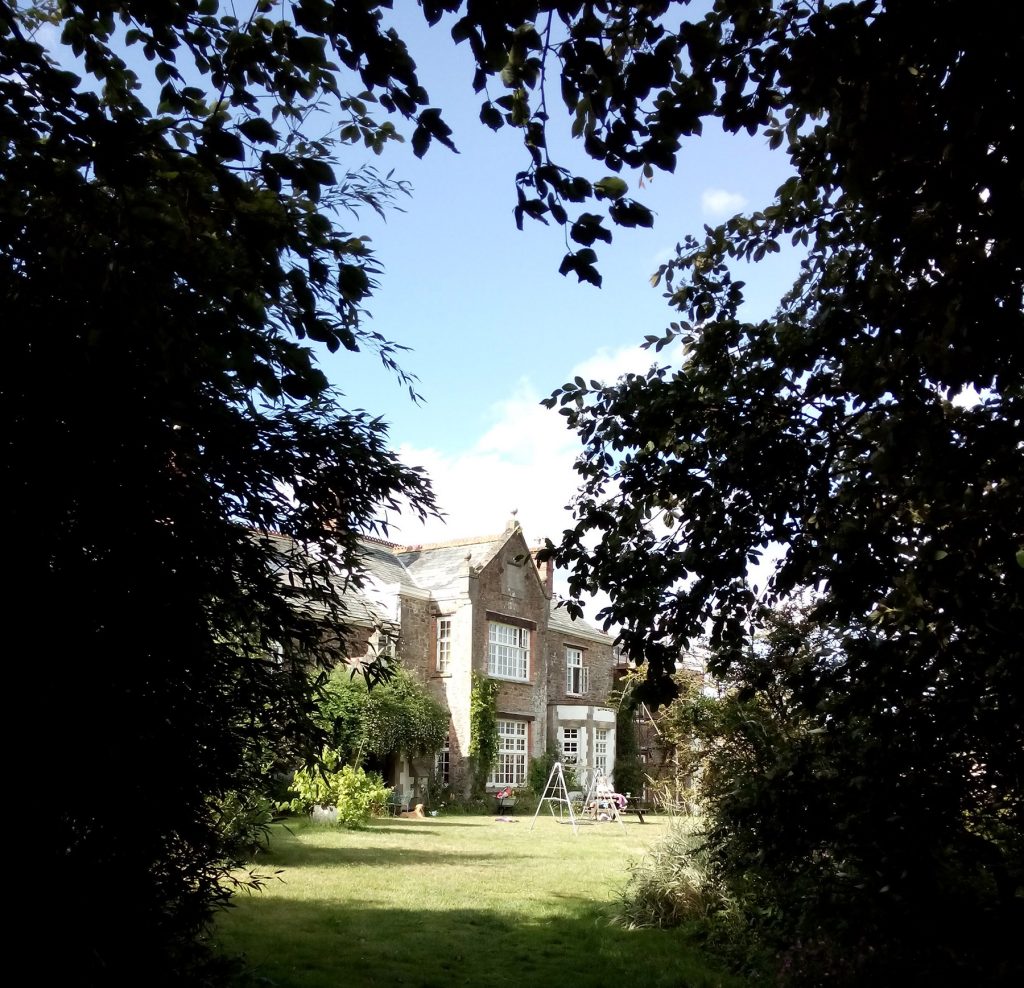 Interacting with Humans
Interacting with Humans
further housing co-op thoughts – this time on interacting with other humans
Straight off the bat I am going to tell you that I am a person who requires a good deal of time alone. Previous to moving to this rural housing co-op (Beech Hill, in mid Devon) I lived alone in Canton in Cardiff, purveying my graphic design and illustration to the masses from my little cave and now and again meeting friends for drinks in Chapter or the Lansdowne or some such. I need time to recover from, well, just life really, and all its stimuli. I do very much like being with people but there needs to be an equal or greater time away from people where I process things and also where the creativity percolates. I am your classic introvert from all those memes you have seen.
So to move to an intentional community would seem like a very silly thing to do, wouldn’t it?
When I was undergoing my test fortnight here community members would warn me that “it might seem like there’s a lot of us here but during the week it can get very quiet and sometimes there’s no-one here” and I would reply “that is perfect” grinningly. And that is how it’s turned out.

sometimes I get to wear amazing safety equipment which is a real plus
I can fester in my room doing paid work and painting skulls and reading Raymond Chandler and Jung and Judith Butler and cutting lino and floofing cats for a good deal of the time, and then I might pop down to the kitchen and there’ll be fresh baked bread and I’ll make myself toast and a cuppa and there’ll be someone else in the kitchen and we’ll have a chat about this or that and sometimes it’s just small talk and sometimes it’s today’s political horrors or whatever they’ve been up to or if I’ve won some new work. And then I return to my room and I feel good. I very rarely feel lonely and I very rarely feel overwhelmed. Even if it seems there’s a hundred people in the kitchen at mealtime including 47 rowdy kids I can take my plate and slope off to my room and nobody minds at all.
And then once a week we have a co-op meeting where we talk about what needs doing and how we’re going to achieve it, be it replacing some curtains or repairing the roof, but before the meeting we all talk a little about where we’re at and how we feel and you get people sharing some really profound news or feelings and sometimes it’s just “I went to the beach and had a lovely time” but it’s a space to catch up with people and really hear how things are going for them.
Death
At the end of October 2016 one of our community members died very suddenly. That evening we all gathered, including the children – maybe 15 of us sat in a circle as we do for a meeting – and one by one shared our thoughts about him and anecdotes and there were a lot of tears and maybe even more laughter than tears and it was beautiful and healthy and natural for us all to come together and share this laughter. I could not help but compare this evening with the evening my mother died and how isolating it felt – just me and my dad and my sister, my ex and her boyfriend sat there awkwardly, and staring at me when I resorted to dark humour – as is my wont in this sort of situation – as if I was being inappropriate. I need to laugh to access grief – and the fact that the community could all share stories and laugh and cry together was really affirming for me. It was at this point I realised on a feeling level that which I already knew intellectually – that humans evolved to live in community and it is good for us to do so – even miserable misanthropes like me.
Function
Obviously the community’s function depends on the individuals of that community, and it really does help that many of Beech Hill’s members have lived here a long time and are very used to living in community, and that other newer members have lived in community before and so they’re able to support and give advice. It is a bit like living in one big shared house, but with no arguments about whose turn it is to do the washing up or clean the bathroom, and with the collective responsibility of maintaining a rambling old manor house and its six acre estate. Honesty is really important – and seems very valued – here.
Disfunction
Of course there is conflict. But there really isn’t that much, and nobody here is deliberately a dick to anyone else. What you do see is how people’s personalities affect how they react to certain situations – how their subconscious mechanisms, their fears, prompt them to do or say certain things. So while someone’s behaviour might frustrate you occasionally you know it’s not really their conscious decision to be that way. I’ve learnt so much about human behaviour, including my own behaviour, and it’s really valuable.
 On my test fortnight here I looked very closely for aggression, manipulative behaviour and my personal pet hate, passive-aggressive behaviour. I found that everyone was very straightforward, including being straightforward about being annoyed with someone else, so it didn’t seem like anything was being hidden from me. If I inadvertently did something wrong this was pointed out gently. And recently, when I made a bigger fuck-up, I apologised fully and explained what I’d done and why and that I wouldn’t do it again, and people were good with that. No-one expects you to be perfect. Again, every community is going to be different so it’d be worth thinking about what you can and can’t live with and observing very closely at when visiting various communities.
On my test fortnight here I looked very closely for aggression, manipulative behaviour and my personal pet hate, passive-aggressive behaviour. I found that everyone was very straightforward, including being straightforward about being annoyed with someone else, so it didn’t seem like anything was being hidden from me. If I inadvertently did something wrong this was pointed out gently. And recently, when I made a bigger fuck-up, I apologised fully and explained what I’d done and why and that I wouldn’t do it again, and people were good with that. No-one expects you to be perfect. Again, every community is going to be different so it’d be worth thinking about what you can and can’t live with and observing very closely at when visiting various communities.
On my own disfunctions, I’ve found it easy and rewarding to be honest here. I said right from the start that I needed a lot of time to myself. Early on, after giving a grand tour of the place one morning to some visitors and being witty and generally performing, I suddenly realised I needed to hide under a duvet. I was supposed to be working alongside the visitors in the afternoon along with some other community members and I knew I couldn’t do this. So I told one of them and they were fine about it and I went and slept for the rest of the afternoon. People are very understanding here, I think especially if you can communicate what’s going on with you which is a thing I’m getting better at.
I think that I am good at being honest, and honest about what my requirements are, and good at hearing other people’s honesty (ie, I won’t hold it against them/react badly). And also I’m good at apologising when I get something wrong. I think these are all really important traits to develop if you’re thinking of living in community.
Outside the community
What I really miss about Cardiff is my amazing circle of friends. Living in a rural area – and being very busy a lot of the time, what with paid work, master’s work and community work – I find it especially difficult to make new friends. I have one very good friend 20 minutes’ drive away and there are some darned lovely folk on my master’s in Falmouth but it would be lovely to know more people locally. I guess that will come with time.
I can’t speak for every kind of personality but I am really enjoying living here at the moment and I really do feel that this is a better way for humans to live. It’s a big jump, and it’s worth visiting a lot of communities (look at Diggers & Dreamers) to find one that’s a good fit for you. I think it just might be the future.


 The latest in a series of posts about living in a housing co-op
The latest in a series of posts about living in a housing co-op This evening someone will bring me my dinner and I’m sure there’ll be other people just checking to make sure I don’t need anything.
This evening someone will bring me my dinner and I’m sure there’ll be other people just checking to make sure I don’t need anything.
 I decided to write this post, partly because when I asked people what they wanted to hear about on
I decided to write this post, partly because when I asked people what they wanted to hear about on 



 Interacting with Humans
Interacting with Humans
 On my test fortnight here I looked very closely for aggression, manipulative behaviour and my personal pet hate, passive-aggressive behaviour. I found that everyone was very straightforward, including being straightforward about being annoyed with someone else, so it didn’t seem like anything was being hidden from me. If I inadvertently did something wrong this was pointed out gently. And recently, when I made a bigger fuck-up, I apologised fully and explained what I’d done and why and that I wouldn’t do it again, and people were good with that. No-one expects you to be perfect. Again, every community is going to be different so it’d be worth thinking about what you can and can’t live with and observing very closely at when visiting various communities.
On my test fortnight here I looked very closely for aggression, manipulative behaviour and my personal pet hate, passive-aggressive behaviour. I found that everyone was very straightforward, including being straightforward about being annoyed with someone else, so it didn’t seem like anything was being hidden from me. If I inadvertently did something wrong this was pointed out gently. And recently, when I made a bigger fuck-up, I apologised fully and explained what I’d done and why and that I wouldn’t do it again, and people were good with that. No-one expects you to be perfect. Again, every community is going to be different so it’d be worth thinking about what you can and can’t live with and observing very closely at when visiting various communities.